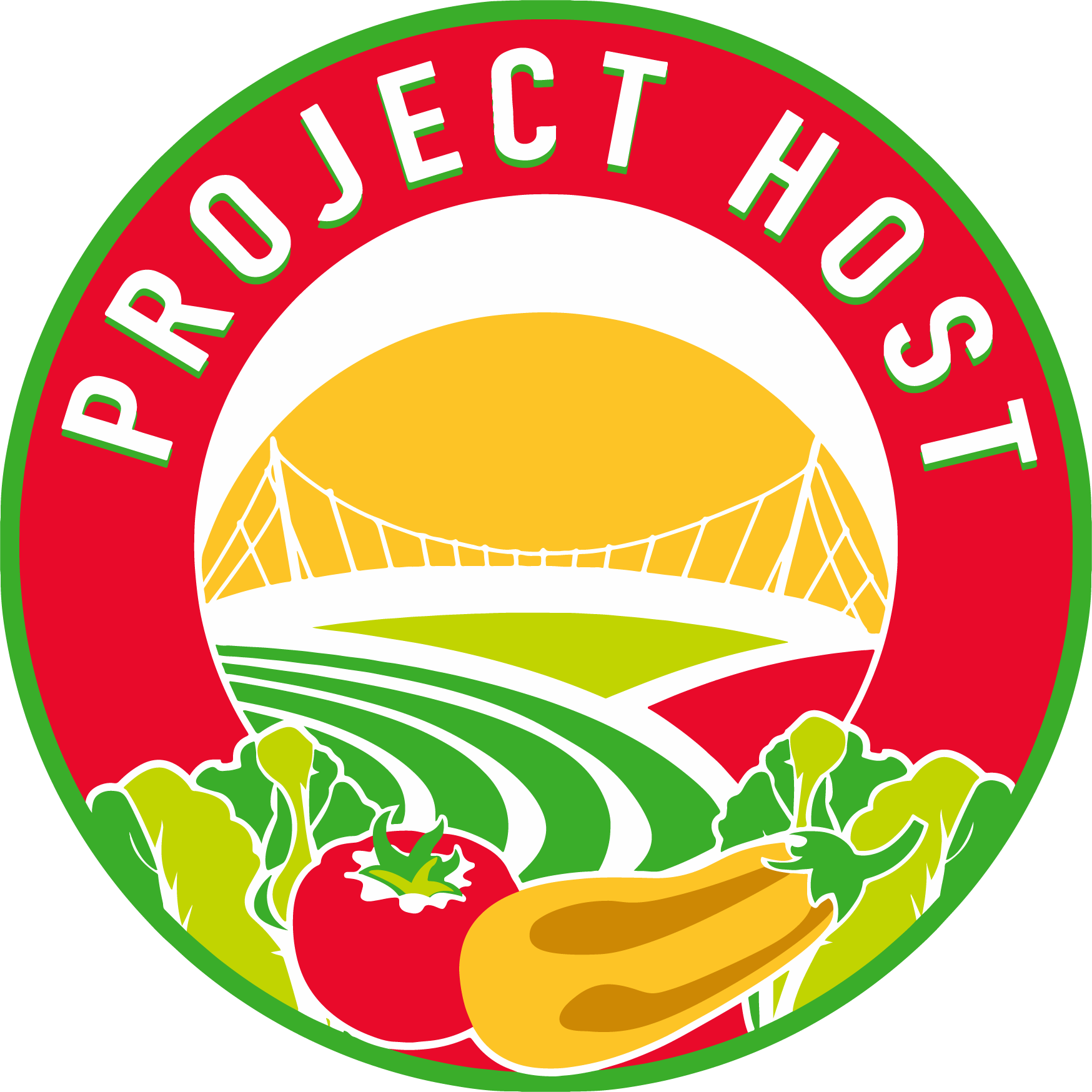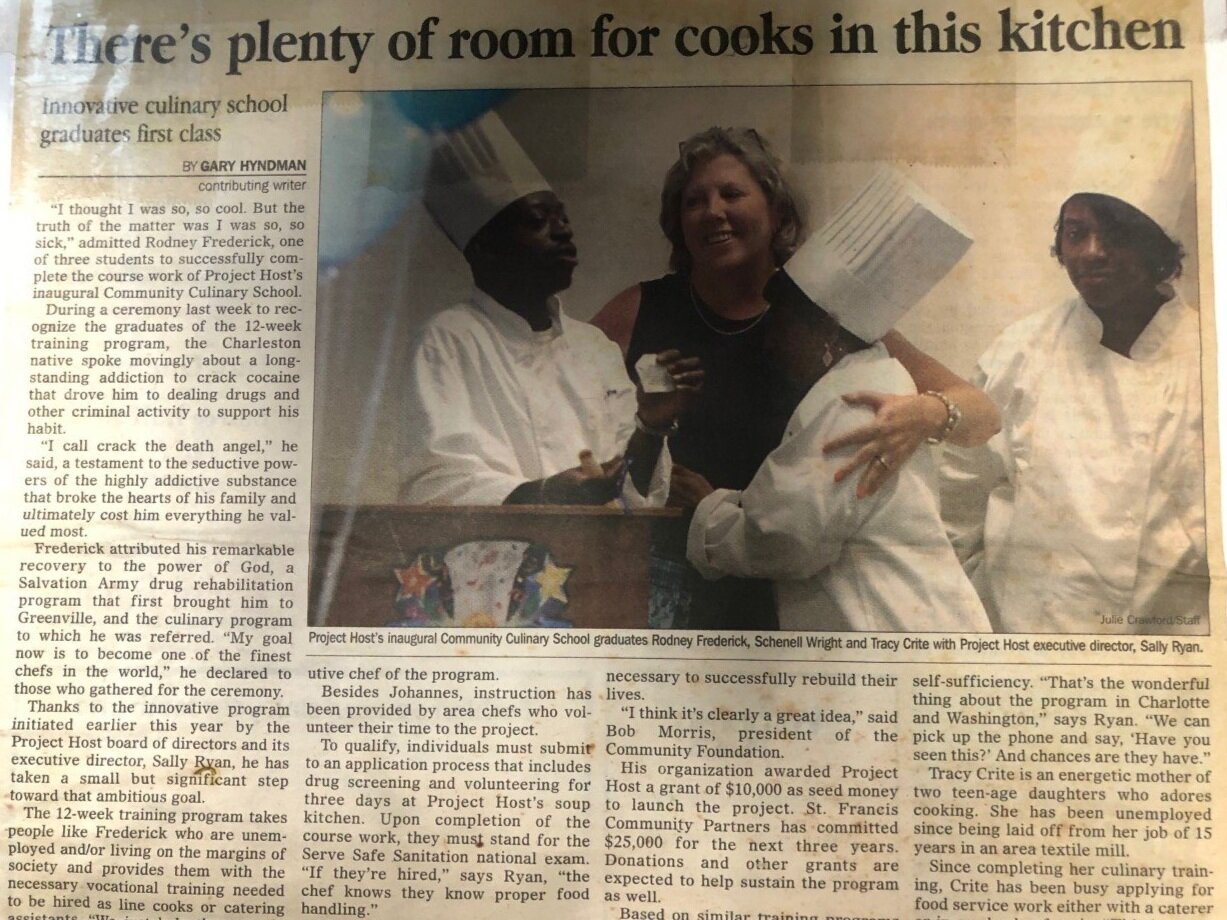Becoming More Than Just a Soup Kitchen
Life sometimes has a funny way of taking you in directions you wouldn’t have necessarily gone on your own. Sally Green probably didn’t picture herself running a soup kitchen, much less turning that meal program into a multipronged, established Greenville-area nonprofit. But her teaching background and her family passion for food and entertaining combined with unforeseen life circumstances all came together in a way that did exactly that.
In 1996 when longtime Project Host Director Jody Fails announced her departure from the organization, Sally had just recently received news that her position at League Middle School wasn’t going to be renewed. The retirement system for teachers had changed, incentivizing long-time teachers to stay on for a few extra years while bumping newer entrants into the profession, like Sally, from their jobs.
Sally had been volunteering at Project Host since 1991, and she stepped into an interim director role for the organization while the board conducted a search. Sally decided to apply, and by August 1996, she was formally heading up Project Host. While her past work experience hardly mapped perfectly onto nonprofit leadership, Sally felt up to the task.
“My teaching background prepared me for this job. A lot of the social problems that I dealt with here, I had dealt with teaching seventh grade.”
When she took on the role, Sally didn’t know just how much teaching would become a central part of her work at Project Host. That aspect first came into play in late 1997 with a program called COOK, short for “Come Over to Our Kitchen.” The program was a joint project with Greenville Literacy Association and invited children from the neighborhood to come in the afternoon after the Soup Kitchen had ended service and learn about nutrition and how to make healthy meals. Soon after the program got started, the initial concept of the garden was developed as an additional space for COOK participants to learn and play.
As time passed, the children in the neighborhood grew, and COOK enrollment dwindled. Yet again Sally found herself with a dilemma: “Each day at 1PM, we had this great building and kitchen and everything closed down and that was it.”
That’s when a friend turned Sally on to the Community Kitchen in Charlotte, which was an organization focused on food rescue. Staff offered free culinary classes to community members who then turned rescued food into meals for various missions throughout Charlotte. Sally learned about the program and adapted it to what would work for Project Host. And so, in 2003, a culinary training program was born, but it didn’t get off the ground without some major hang-ups.
“We were working either with the Soup Kitchen volunteers, who really didn’t want us in the kitchen because they wanted to make the meals, or then we were doing the school stuff—like life skills and ServSafe—in the storage room.”
Aside from space issues, there was also the question of purpose. If students weren’t making food for the Soup Kitchen, where was the food they were preparing going to go?
Enter the Sterling Center, a nearby afterschool program that happened to have culinary needs at seemingly just the right moment.
“They came to us because their kids were getting food from the school system. It was pizza on Monday and cold sandwiches the rest of the week, and kids were not eating it. They asked if we could provide the meals for them, and that gave the culinary school more of a purpose and a focus.”
A local news article featuring Sally Green embracing members of the first culinary class.
Additional conversations took place with other afterschool programs, and soon the Feeding Hungry Children Project (now Cooking for Kids) was added to the Project Host program umbrella. The culinary school grew and flourished, with Sally co-teaching the (at the time) 12-week long course to mostly guests of the Soup Kitchen. But, with growth came more challenges:
“We were feeding more and more afterschool programs. The school was very busy, and we couldn’t keep flipflopping back and forth between the kitchen and storage room. The school needed a designated space, especially a classroom. Our classroom was a storage room with no heat and no air. It just wasn’t working.”
It was then that Sally took on her largest fundraising and logistical feat yet as executive director. She and her board of directors launched and oversaw a $1 million capital campaign to add another full commercial kitchen, classroom, and additional offices onto the original Project Host footprint. To pull off the campaign, they would need the support of businesses, foundations, churches, and private individuals. Longtime Project Host volunteer and supporter Frank Halter was particularly crucial to the fundraising effort, drumming up support across Greenville for the campaign.
For Sally’s part, there was one person in particular who she thought may be interested in funding the new culinary school: Betty Pearce, wife of the late Christopher C. (CC) Pearce III.
CC Pearce had for a long time supported Project Host. There was a natural affinity, given the Pearce family business was wholesale food distribution. The family ran Pearce-Young-Angel, which eventually became PYA/Monarch, one of the largest food distributors in the nation. Knowing there was need at the Project Host Soup Kitchen, CC Pearce supported the nonprofit by offering a sizeable credit to PYA each year.
When CC Pearce passed away in 2002, his wife Betty knew she wanted to do something to honor his memory. “I wanted to do something, but I couldn’t come up with what I thought was really meaningful for him. I talked to Sally a little bit, and we decided to let it float for a time.”
Then, in 2003, after the culinary school had been running in sub-optimal conditions sharing the Soup Kitchen space for a while, Sally approached Mrs. Pearce with the idea of naming the new school facility after CC Pearce:
“A year or so after that initial conversation, Sally came to me and said she’d heard about a program in Charlotte and thought it might be something I’d be interested in supporting. After I got all the information, I said, ‘that was absolutely made to order for him.’ I knew that would’ve made CC so happy. I loved the idea of people having a profession—a program to get them into something that they could do to support themselves. I thought that was fabulous! And through food, no less!”
Betty Pearce breaks ground for the new CC Pearce Culinary School in 2004.
With a sizeable portion of the funding for the building addition secured, Project Host broke ground and the CC Pearce Culinary School was formally christened, graduating its first class in the new facility in 2006. For Mrs. Pearce, the school has been an extremely rewarding endeavor and investment:
“I love coming to all of the graduations. One time I went into a little place along Poinsett Highway, and this fellow who had graduated from the school came out of the kitchen, and he said, ‘Mrs. Pearce, I’ve still got my job!’ Well, I got into my car and cried. I was thrilled. That kind of thing is wonderful. I also love watching the families watch students graduate. The kids and the parents of the students are so proud.”
For Sally, who was always more in the thick of things as executive director, the feelings of pride at watching successes are mixed with the sobering realities of the inevitable challenges and disappointments that come with this kind of enterprise:
“At the beginning of a class, everybody comes in, and some of the students are really excited, while some are really scared or shy. To be able to observe the changes in the people who came through was the biggest thrill—watching and seeing what’s going to happen. When I ran just the Soup Kitchen, my job was not to change people, but to feed everyone who was hungry. A school was trying to change lives. You get invested, and sometimes you get hurt.”
In some ways, the school also provided Sally a form of education, where she learned to recognize that her way of seeing of world and what was normal came from an extremely privileged position:
“I and other staff would see things as barriers that students don’t. We’re looking at it from our privileged point of view, where things like lack of childcare or transportation are major barriers. From a lot of students’ points of view, this is the norm.”
The school remains as humbling and eye opening now as it was for Sally then. The stories of remarkable resilience abound, and the heartbreaks of watching talented, passionate individuals run into dead ends exist too.
True to her teacher roots, Sally never let the prospect of imperfect outcomes deter her and instead embraced the spirit of trial and error. She was always asking: What’s one more way we can utilize our space, our gifts, our networks and resources to better the lives of those around us, even if there are challenges in developing these programs or the outcomes aren’t always perfect?
Sally’s can-do spirit, together with the partnership and generosity of community members and the unwavering support of volunteers, came together so that within the first 10 years of Sally’s leadership, Project Host had expanded its mission to include training and had grown from just a Soup Kitchen into much more of what it is today.
By Claudia Winkler



